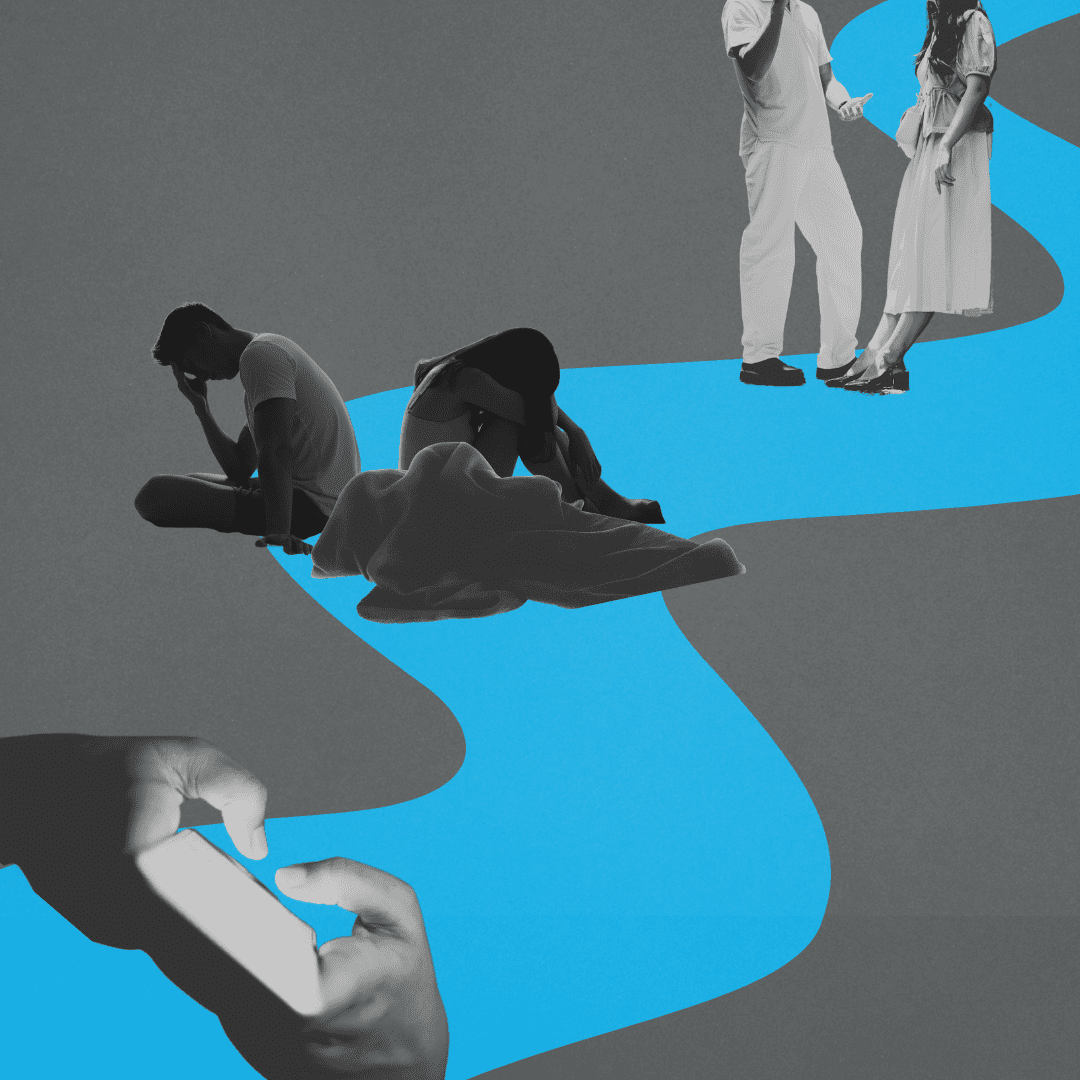You’re here because you’re wondering: Am I dating an alcoholic?
If you’re having a hard time answering this question, that’s completely normal – the answer isn’t always cut-and-dry. Maybe you’re getting mixed signals; for example, drinking too much on the weekends but remaining sober during the week. Perhaps they seem high-functioning. Plus, it’s a sensitive topic to bring up early in a relationship.
But whether you’re simply curious about a partner’s relationship with alcohol or you’re noticing some red flags that worry you, getting a clear answer is important. The truth is that this road can be unpredictable.
How does alcohol affect relationships? The answer can depend on where your partner is in their sobriety journey.
If they are in active addiction, their relationship with alcohol can be the toxic elephant in the room. If they are diligently pursuing sobriety, the topic of alcohol will be something that you’ll need to approach with compassion and sensitivity. Whichever the case, the most important thing is to avoid taking on responsibility for their behavior.
There’s a lot to unpack with this topic. Let’s start with the telltale signs that the person you’re dating is an alcoholic.
Editor’s note: When we talk about an “alcoholic,” we’re referring to someone who is struggling with an alcohol use disorder. While the term “alcoholic” is still widely used, it is outdated and can sometimes carry negative connotations and judgment, which can hinder understanding and compassion. In certain instances, we do include “alcoholic” to ensure that a wide range of individuals – who adopt a wide range of terms – can easily find and access our resources. However, it’s more accurate and empathetic to use the phrase “person with an alcohol use disorder.” This term reflects the complexity of the condition rather than ascribing it to someone as a personality trait.
What are the signs I’m dating an alcoholic?
While your “spidey sense” may be telling you that there’s something up with your partner’s drinking, let’s start by getting clinical.
According to the DSM-5-TR, alcohol use disorder (AUD) is a problematic pattern of alcohol use leading to clinically significant impairment or distress.1
Bear in mind that being someone’s boyfriend or girlfriend – no matter how well you know them – doesn’t give you the ability to diagnose them. However, anyone meeting at least two of the DSM-5-TR’s criteria within a 12-month period may have AUD.
And even if you’re not an addiction professional, it’s still important to recognize how alcoholics typically behave in relationships. Understanding these behaviors can help you set healthy boundaries and make informed decisions about your own well-being. It’s crucial to know when to leave an alcoholic, as staying in an unhealthy relationship can have detrimental effects on your mental and emotional health. Recognizing the signs of dependency and its impact on the relationship can empower you to prioritize your own needs.
10 signs that should send your antenna straight up:
- It seems like they always “push it” with drinking: They may keep ordering drink after drink at a family event where everyone else is just having one or two. Every nice dinner out where you were planning a meal with a glass of wine ends with them being drunk.
- They’re doing unsafe things while drinking: If they’re getting behind the wheel, going swimming, taking night walks, or getting into other unsafe situations while drunk, this can be a red flag.
- It seems like their life revolves around drinking: Does it feel like they can never spend time with you without introducing alcohol into whatever you’re doing?
- They’re binge drinking: Binge drinking and heavy alcohol use increase the risk of alcohol use disorder (AUD).2 For men, binge drinking is defined as consuming five or more drinks in a period of two hours. Heavy drinking is defined as having 15 or more drinks per week.
- They clearly crave alcohol: Do they seem irritable when they don’t have access to alcohol? Are they eager to get out of the house to obtain alcohol after they’ve run out?
- Alcohol use is interfering with their responsibilities: If you’re noticing that they’re frequently missing work or not showing up when they say they’ll be somewhere, this is a sign of AUD.
- You’ve witnessed them experiencing alcohol withdrawal symptoms when they don’t drink: Does your partner suspiciously get “sick” whenever you’re in a place where they aren’t able to drink? If your partner cuts back on alcohol either of their own will or because there’s no access to it, they may experience restlessness, difficulty sleeping, the shakes, sweating, irritability, strong mood swings, nausea, or hallucinations.
- Their alcohol tolerance shocks you: Are you shocked that your partner appears to be able to easily return to work or drive their car after throwing back drinks? Research shows that drinkers with AUD display less impairment on fine motor and cognitive tasks than light or heavy social drinkers after consuming a standard intoxicating dose equaling four to five drinks producing breathalyzer readings of 0.08% to 0.09%.3
- They cover up or justify their drinking: If you’re noticing alcohol on their breath or empty alcohol bottles stashed away, this is a sign that they are hiding their drinking habits from you. Secret drinking is often an indication of AUD. Alarm bells should also sound if your partner constantly justifies their excessive drinking. For example, they may use any small good thing that happens as a reason to “celebrate” with a drink. Additionally, they may also tell you that they deserve a “reward” after a hard day.
- Their drinking is affecting your relationship: Have you ever had a fight over their drinking? Has their behavior while intoxicated embarrassed you in front of family or friends? Are they not showing up or handling responsibilities when promised? Whether you’re hurt because they’re unreliable or their mood swings are causing them to blow up at you, arguments that can be traced back to drinking point strongly to the fact that you’re in a relationship with an alcoholic.
What is it like being in a relationship with an alcoholic?
Loving an alcoholic can be tumultuous. Understanding the impact of dating an alcoholic is important before the dynamics of the relationship erode your self-confidence and sense of judgment.
There’s no need to stigmatize partners based on their addiction history. However, it’s important to know that dating someone in active addiction can pose the risk for codependency.
A 2016 study examining the relationship between living with addicted men and codependency found that codependency scores were significantly higher among addicted men’s wives.4 Most codependent relationships involve some form of addiction, abuse, or mental illness.5
When dating an alcoholic, it can be easy to slip into a caregiver role that makes your self-worth and emotions entirely dependent on the other person. Perhaps you only feel happy when they are happy with you.
This can drive you to enable their behaviors, cover up their behaviors, and shield them from the consequences of their own actions. If their behavior is explosive, you may isolate yourself from others in an attempt to hide how bad things are getting.
Supporting a partner in recovery
What are the struggles of dating an alcoholic? The constant fear of relapse can put a strain on relationships.
While you aren’t responsible for their sobriety, there’s no way around the fact that your priorities and habits will need to align with their recovery rules – i.e. avoiding situations placing your partner near alcohol – if the relationship is going to be successful.
Wondering how to handle an alcoholic boyfriend, girlfriend, or spouse? Here are some tips for how to be supportive: It’s important to approach the situation with compassion and understanding. Encourage open communication and express your feelings without judgment, as this can help your alcoholic spouse feel safe to share their struggles. Additionally, consider seeking support for yourself from counseling or support groups, as navigating this journey can be challenging.
- Educate yourself on recovery: Before getting too deep into a relationship, learn about the sobriety journey to see if you’re willing to commit to providing the support required.
- Create boundaries: Decide what the “breaking point” is for you if your partner relapses. Clearly communicate to your partner exactly where the line is being drawn.
- Prepare for setbacks: “On average, two-thirds of individuals treated for alcohol use disorder (AUD) relapse within six months,” according to a 2021 study.6 While optimism is helpful, naivety can cause you to feel resentful.
- Learn the difference between supporting and enabling: Financially bailing a partner out, making excuses, hiding their behaviors, allowing alcohol in the house, and drinking with your partner are all enabling behaviors. Meanwhile, supporting them looks like creating accountability, praising positive behaviors, and helping them to follow their treatment plan.
- Prioritize your mental health: Your parent’s sobriety cannot become the sole focus of your life. Make sure you are maintaining close relationships with others, prioritizing your mental health, and focusing on the things that are within your control instead of obsessing about what a partner may or may not do.
Final thoughts: Deciding whether to stay or leave when you’re dating an alcoholic
Yes, there can be true love after addiction. In fact, a partner who has been through hell and back with AUD can be one of the most understanding and sensitive people you’ll ever meet.
But for those who choose to stay in relationships with people struggling with AUD, mistrust can be a toxic thread leading to anxiety and arguments.
One sign that a relationship is worth staying in? Your partner is willing to not only pursue sobriety, but hold themselves accountable to this goal in a concrete way. Accountability tools like BACtrack View, for one, create full transparency by allowing your partner to regularly prove they’re remaining sober.
At the end of the day, the same keys to a successful relationship apply whether you’re dating an addict or someone who has never struggled with substances. Honesty, transparency, and willingness to communicate about anything will let you conquer the world together.
Just be sure to go in with your eyes open.
Sources
- https://www.niaaa.nih.gov/publications/brochures-and-fact-sheets/alcohol-use-disorder-comparison-between-dsm ↩︎
- https://www.niaaa.nih.gov/alcohols-effects-health/alcohol-drinking-patterns ↩︎
- https://www.uchicagomedicine.org/forefront/research-and-discoveries-articles/people-with-alcohol-use-disorder-impaired-after-heavy-drinking-despite-claims-of-higher-tolerance ↩︎
- https://www.uchicagomedicine.org/forefront/research-and-discoveries-articles/people-with-alcohol-use-disorder-impaired-after-heavy-drinking-despite-claims-of-higher-tolerance ↩︎
- https://www.webmd.com/mental-health/signs-codependency ↩︎
- https://pmc.ncbi.nlm.nih.gov/articles/PMC8476113/ ↩︎

